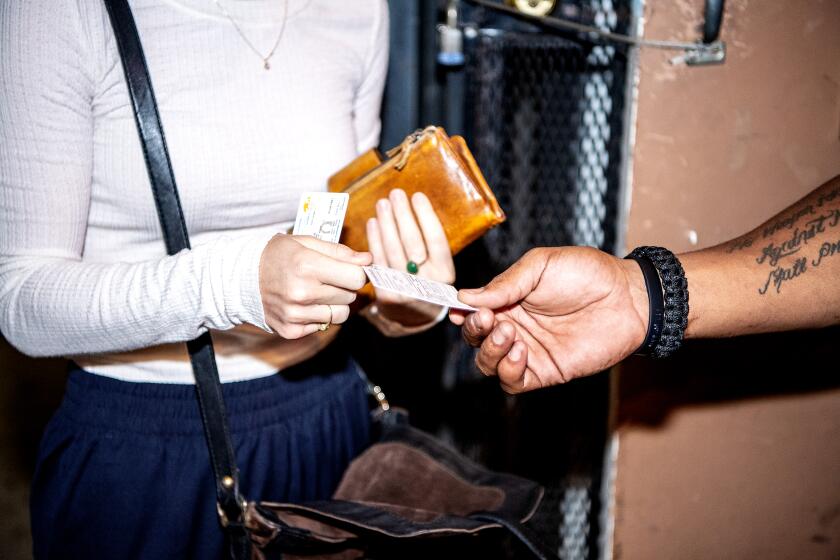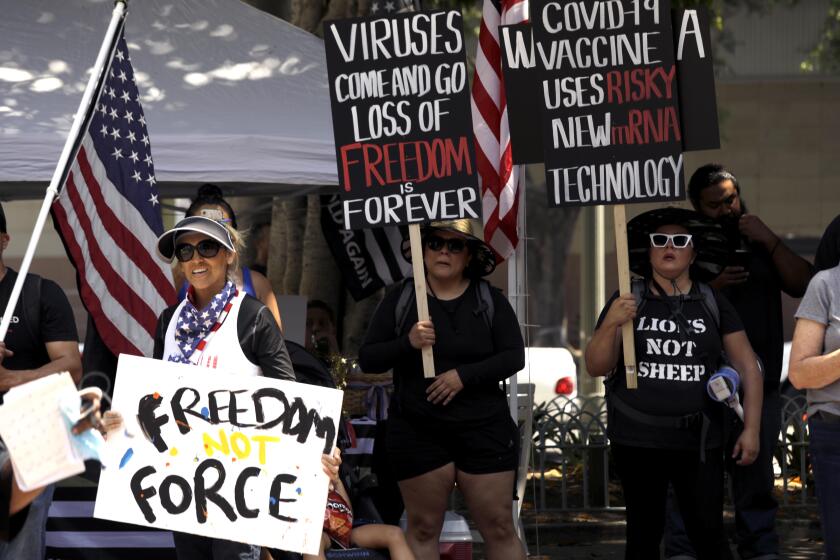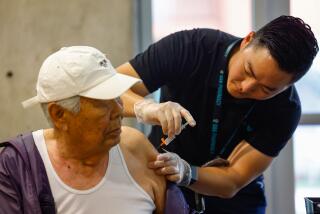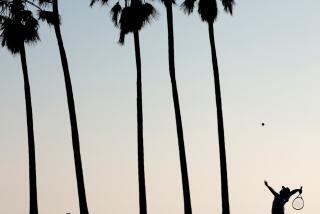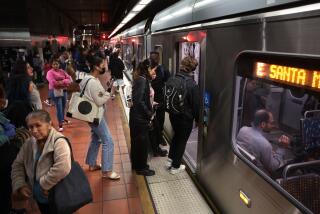Why do unvaccinated COVID survivors also need a vaccine?
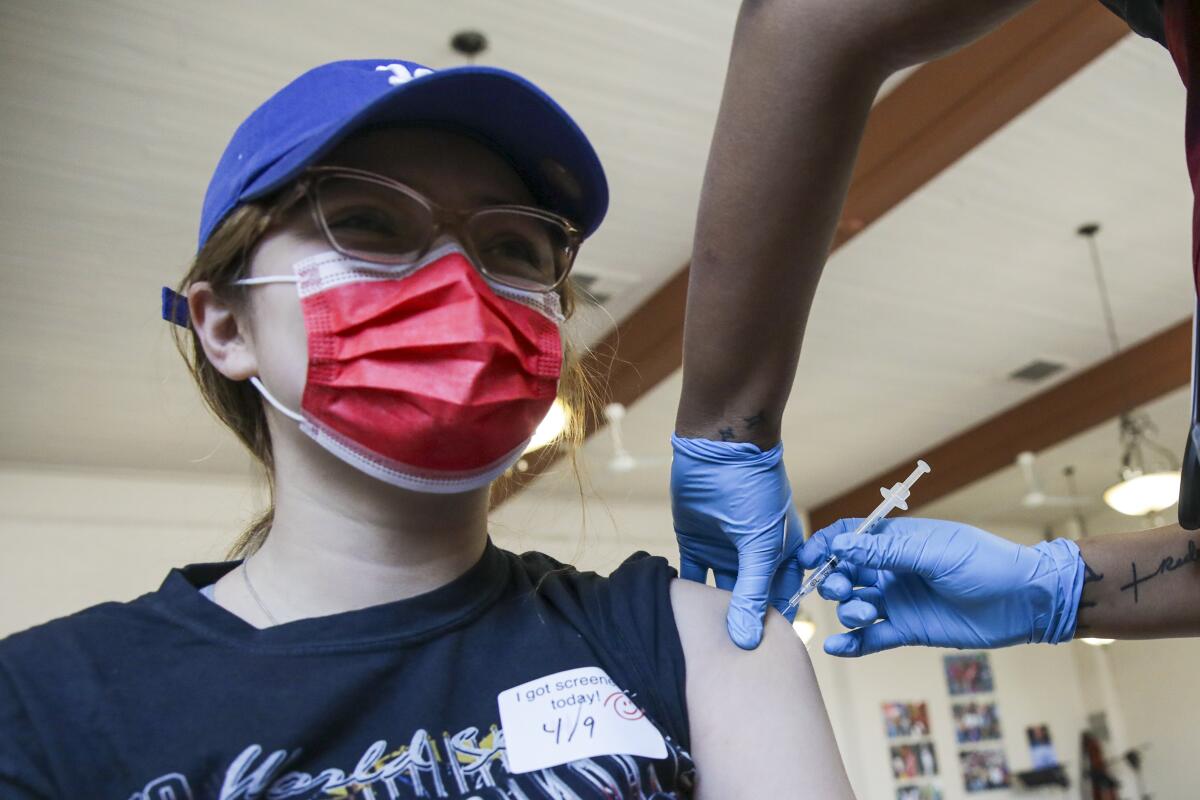
- Share via
Californians are increasingly being expected to show proof of COVID-19 vaccination as a condition of work and recreation. But why do those who have survived a brush with the disease, and thus acquired natural immunity to the coronavirus, also have to get a shot?
The contention that a prior infection provides protection from the virus that’s just as robust as being inoculated has long been used as an argument against requiring the shots. But health officials say there are a few reasons everyone, including COVID-19 survivors, should roll up their sleeves.
Experts agree that getting, and then getting over, COVID-19 generally does confer some natural immunity. But the degree of that protection might differ depending on the person and may not last as long as a vaccination.
Data suggest that unvaccinated people who survive COVID-19 will be far more protected if they get vaccinated after recovering from their illness.
Customers must present proof of vaccination to enter many indoor businesses in Los Angeles starting Nov. 4 under an ordinance approved by the City Council.
After a coronavirus infection, “it looks like your protection may vary” depending on a number of factors, Los Angeles County Public Health Director Barbara Ferrer said.
“It is absolutely true,” she said of COVID-19 survivors who haven’t been vaccinated, “you have some immunity. But it doesn’t last for very long, or for long enough, given how long the pandemic is going on.”
Natural immunity isn’t bulletproof. There have been a number of documented reinfections of the coronavirus detected around the world.
A study conducted in Kentucky and published by the U.S. Centers for Disease Control and Prevention found that among those previously infected in 2020 with the coronavirus, unvaccinated people had more than twice the odds of being reinfected with the coronavirus by 2021 than people who were fully vaccinated.
The CDC now says that people who test positive for the coronavirus again three months after getting over a previous infection should be considered as having a new case of the virus, Ferrer said. Government officials suspect that their waning natural immunity allowed the virus to invade their bodies again.
“There’s more compelling evidence that indicates that if you’ve been infected, you really benefit tremendously from getting vaccinated. And that it really boosts your system … to be prepared to fend off the virus the next time there’s a threat to your body,” Ferrer said.
While it’s also possible for people who have been vaccinated to get infected, officials emphasize that those who are not inoculated still remain especially exposed, particularly given the omnipresence of the highly infectious Delta variant.
Unvaccinated Californians are roughly eight times more likely to get infected with the coronavirus — and almost 18 times more likely to die from COVID-19 — than their fully vaccinated counterparts, according to recent data from the state Department of Public Health.
Lawmakers are expressing concerns that allowing broad exemptions in the mandate will undermine the state’s effort to protect schools.
“The recommendation is clear that you should be vaccinated even if you’ve had naturally acquired disease,” UC San Francisco epidemiologist Dr. George Rutherford said in an interview.
Aside from the uncertainty about the endurance of natural immunity, officials say there are practical reasons the new vaccine requirements don’t include a carve-out for those who have previously had the disease.
While physical and digital records are readily accessible for test results and vaccinations, officials say it would be impossible to assess the level of protection someone has gained from a prior infection.
L.A. County is one of the jurisdictions that have mandated COVID-19 vaccinations for their workers. Starting Thursday, the county also will begin requiring participants and workers at outdoor events with more than 10,000 attendees to provide proof of vaccination or show they’ve recently tested negative for the coronavirus.
At indoor bars, wineries, breweries, nightclubs and lounges, patrons and employees also will have to document that they’ve received at least one vaccine dose by Thursday and that they are fully vaccinated by Nov. 4.
Healthcare workers statewide also are being required to show proof of vaccination to continue to work, while allowing limited exemptions for medical and religious reasons.
Dr. Christina Ghaly, the L.A. County director of health services, said some county employees who have survived COVID-19 but have not been vaccinated have asked whether they have measurable levels of antibodies to prove they are immune to COVID-19.
There is currently no evidence that allows health officials to discern that, Ghaly said.
“As much as we might like to read into that, the evidence just isn’t there to support that kind of analysis at this point,” Ghaly said.
More to Read
Sign up for Essential California
The most important California stories and recommendations in your inbox every morning.
You may occasionally receive promotional content from the Los Angeles Times.
